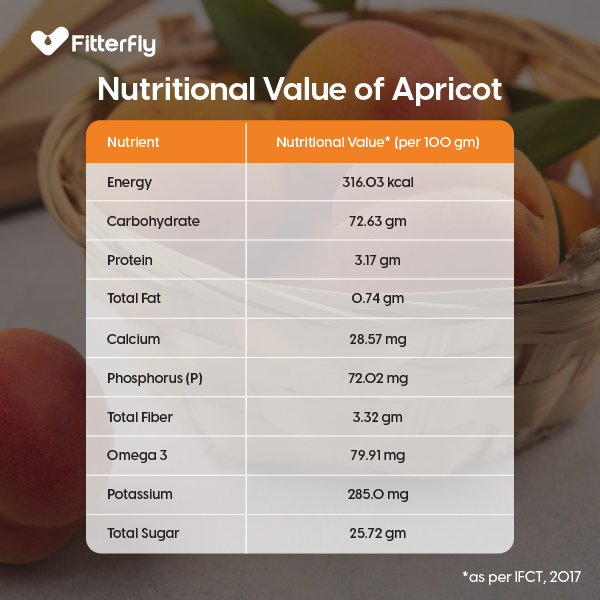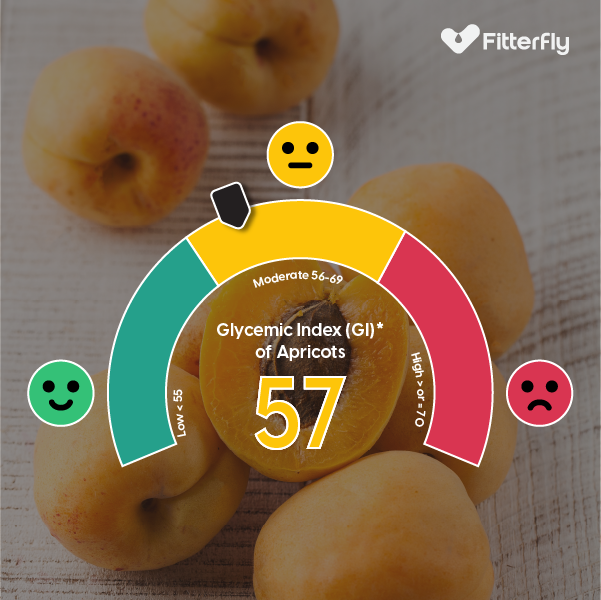Are Apricots Good for Diabetes?

Managing diabetes requires careful attention to what you eat. While fruits are often considered a healthy option, not all fruits are equally beneficial for people with diabetes.
Apricots, known as Khumani in some regions, is one such fruit that might raise questions. However, apricots seem like a healthy choice due to their rich nutritional profile.
But if you’re dealing with diabetes, you might want to think twice before adding them to your diet. In this blog, we’ll explore why apricots may not be the best option for managing blood sugar levels and how they could potentially pose risks for people with diabetes.
How Well Do You Know About Apricots?
We all know apricots, commonly called khumani in Hindi. These small, orange fruits have smooth skin and a slightly sweet taste. But what is apricot really, and where does it come from?
Apricots primarily originate from Afghanistan and surrounding regions, not from India as many might assume. Their exotic appeal and distinct flavour have made them a popular choice around the world.
What is the Nutritional Value of an Apricot?
Apricots are often praised for their nutritional benefits, being rich in vitamins A and C, fiber, and potassium. However, for people with diabetes, these nutrients come with a potential downside.
The sugar content in apricots, although natural, can significantly impact blood sugar levels. This is why it’s essential to understand the nutritional composition of apricots and their effects on diabetes management.
According to the Indian Food Composition Tables (IFCT) 2017, 100 grams of dried apricots contain:

What is the Glycemic Index of Apricots?
The Glycemic Index (GI) is a crucial factor to consider when determining whether a food is suitable for a diabetes diet. Foods with a low GI are generally better for managing blood sugar levels. Dried apricots have a moderate glycemic index of approximately 57, which means they can cause a noticeable rise in blood sugar levels.


Is Apricot Good for Diabetes?
The answer is NO. While apricots might offer some health benefits, they are not particularly great for people with diabetes.
Dried apricots have around 26 grams of natural sugars, which can lead to spikes in blood sugar, making it difficult for those with diabetes to maintain control over their condition.
What are the Health Benefits of Apricots for Diabetes?
Yes, apricots are rich in vitamins and antioxidants, which are generally good for health. However, when you’re thinking of apricots for diabetes, these benefits don’t outweigh the potential risks.
The sugar content in apricots, even in small amounts, can be harmful to those with diabetes, overshadowing the possible health benefits.
What are the Potential Side Effects of Apricots for Diabetes?
Apricots, while generally nutritious, can have certain potential side effects for people with diabetes that are important to consider:
1. High Sugar Content
Apricots, especially dried ones, contain natural sugars that can spike blood sugar levels if consumed in excess. Managing portion size is crucial to avoid sudden increases in blood sugar.
2. Carbohydrate Impact
Although fresh apricots have a lower glycemic index, their carbohydrate content can still contribute to higher blood sugar levels. People with diabetes need to count these carbs within their daily allowance.
3. Hidden Calories
Dried apricots are calorie-dense, and consuming too many can lead to weight gain, which may worsen diabetes control. Monitoring calorie intake is essential for managing diabetes.
4. Interaction with Medications
Apricots are rich in potassium, which might interfere with diabetes medications, particularly if you are on potassium-sparing diuretics. This interaction can lead to hyperkalemia, a condition where potassium levels in the blood become too high.
5. Digestive Issues
High fiber content in apricots, particularly when consumed in large quantities, can cause digestive discomfort, such as bloating, gas, or diarrhea, which can affect overall health and well-being.
How to Incorporate Apricots in a Diabetes Diet?
If you still want to include apricots in your diet, it’s crucial to do so as little as possible. Opt for small portions and pair them with foods that have a low glycemic index to help balance the impact on your blood sugar like chana, sprouts, salads etc.
But remember, apricot and diabetes is not an ideal match, so it’s better to seek alternatives that are safer for your condition.
Diabetes-Friendly Recipes for People with Diabetes
Given the potential risks, it’s better to focus on diabetes-friendly fruits like apples, jamun, guava in your recipes. These fruits have lower sugar content and are safer options compared to apricots.
Avoid using apricots in desserts or snacks meant for diabetes management, as even small amounts can be detrimental.
Any Potential Risks and Precautions?
When it comes to consuming apricots for people with diabetes, there are some potential risks and precautions to be aware of:
Potential Risks
1. Blood Sugar Spikes
Apricots contain natural sugars that can lead to elevated blood glucose levels, particularly if consumed in large amounts or as dried apricots, which have concentrated sugars.
2. Caloric Overload
Dried apricots are calorie-dense. Overconsumption can contribute to weight gain, which can complicate diabetes management and increase insulin resistance.
3. Potassium Levels
Apricots are high in potassium. While generally beneficial, excessive potassium intake can be risky for individuals with kidney issues, which are common in diabetes. High potassium levels can lead to hyperkalemia, especially in those taking certain medications.
4. Digestive Discomfort
The fiber in apricots, while beneficial for digestion, can cause issues like bloating or diarrhea if consumed in excess, particularly in dried forms.
5. Possible Allergic Reactions
Some individuals may have allergic reactions to apricots, which can include symptoms like itching, swelling, or difficulty breathing. Although rare, it’s a risk worth noting.
Precautions
1. Portion Control
Limit the intake of apricots, particularly dried apricots, to prevent blood sugar spikes. Fresh apricots are preferable due to their lower sugar content.
2. Monitor Blood Sugar
After consuming apricots, especially if you are unsure how they affect your blood sugar levels, it’s important to monitor your glucose levels closely. This will help you understand how your body reacts and adjust your intake accordingly.
3. Choose Fresh Over Dried
If you absolutely have to eat apricots, then Opt for fresh apricots rather than dried ones to minimize sugar and calorie intake. Fresh apricots have a lower glycemic load, making them a safer option for managing blood sugar.
Is Dried Apricot Good for Diabetes?
No! Dried apricots are even higher in sugar than their fresh counterparts due to the concentration process. This makes them even more likely to cause blood sugar spikes, posing a serious risk to diabetes management.
How We At Fitterfly Can Help You?
Apricots, while nutritious otherwise, may not be the best choice for diabetes management due to their moderate glycemic index and sugar content, which can cause blood sugar spikes. At Fitterfly, we guide you towards better fruit alternatives that go well with your health goals and help manage your blood sugar levels effectively.
Our Diabetes Prime program offers personalised solutions tailored to your unique dietary needs, exercise routines, and mental wellness. We work closely with you to develop a plan that fits your lifestyle while ensuring better control over your blood sugar levels. By providing guidance on portion control and healthier food choices, we help you enjoy meals that are both satisfying and diabetes-friendly.
If you want to manage your diabetes like a pro, you need the best support. Take the first step by opting for the Fitterfly Diabetes Prime Program. Just give us a missed call at 08068507599, and we’ll help you get started!
This blog provides general information for educational and informational purposes only and shouldn't be seen as professional advice.
Frequently Asked Questions
Does apricot increase blood sugar?
Yes, apricots can cause an increase in blood sugar levels, making them unsuitable for people with diabetes.
How many dried apricots can people with diabetes eat?
It's best to avoid dried apricots entirely if you have diabetes due to their high sugar content.
Are apricots high in sugar?
Yes, apricots are relatively high in natural sugars, which can impact blood sugar levels.
Who should not eat apricots?
People with diabetes or those trying to manage their blood sugar levels should avoid apricots.
Which dry fruit is not good for diabetes?
Dried apricots are not good for diabetes due to their high sugar concentration.
Which dry fruit is good for diabetes?
You cant have dry fruits (like figs, dates/khajur, kishmish/raisins, black currents/munakka) as they can spike your blood sugar levels, instead have nuts and seeds Nuts like almonds and walnuts are better options for people with diabetes as they have lower sugar content and offer healthy fats.




















